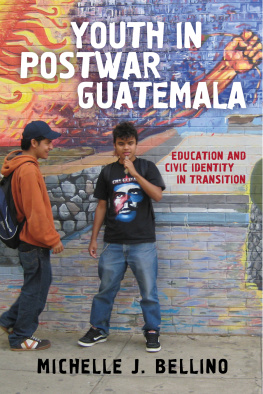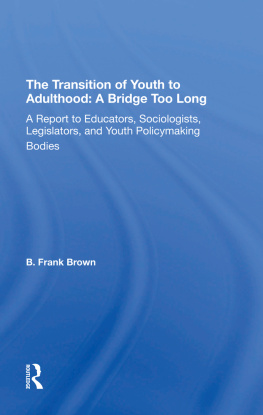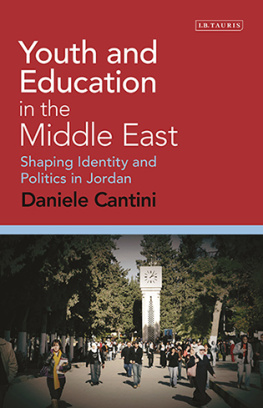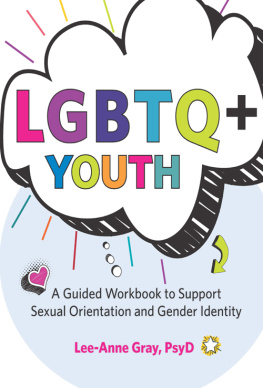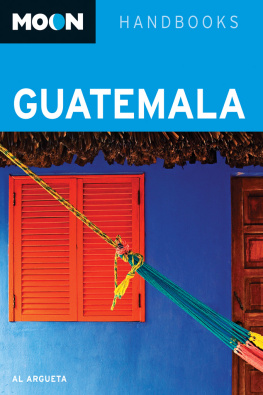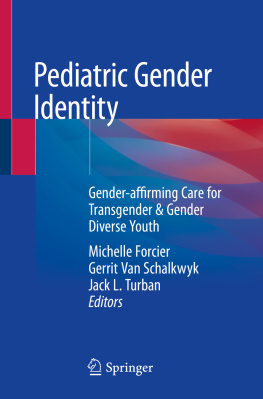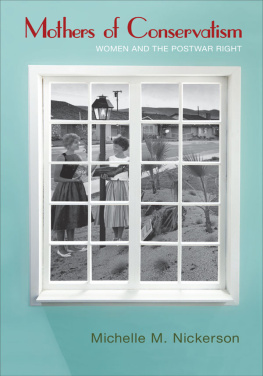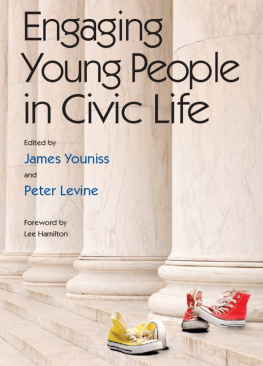Youth in Postwar Guatemala
The Rutgers Series in Childhood Studies
The Rutgers Series in Childhood Studies is dedicated to increasing our understanding of children and childhoods throughout the world, reflecting a perspective that highlights cultural dimensions of the human experience. The books in this series are intended for students, scholars, practitioners, and those who formulate policies that affect childrens everyday lives and futures.
Edited by
Jill E. Korbin, Associate Dean, College of Arts and Sciences; Professor, Department of Anthropology; Director, Schubert Center for Child Studies; Co-Director, Childhood Studies Program, Case Western Reserve University
Elisa (EJ) Sobo, Professor of Anthropology, San Diego State University
Editorial Board
Mara Buchbinder, Assistant Professor, Department of Social Medicine, University of North Carolina, Chapel Hill
Meghan Halley, Assistant Scientist, Palo Alto Medical Foundation
David Lancy, Emeritus Professor of Anthropology, Utah State University
Heather Montgomery, Reader, Anthropology of Childhood, Open University (UK)
David Rosen, Professor of Anthropology & Sociology, Fairleigh Dickinson University
Rachael Stryker, Assistant Professor of Department of Human Development & Womens Studies, California State University, East Bay
Tom Weisner, Professor of Anthropology, University of California, Los Angeles
Founding Editor: Myra Bluebond-Langner, UCL-Institute of Child Health
For a list of all the titles in the series, please see the end of the book.
Youth in Postwar Guatemala
Education and Civic Identity in Transition
Michelle J. Bellino
Rutgers University Press
New Brunswick, Camden, and Newark, New Jersey, and London
978-0-8135-8799-8 (paper)
978-0-8135-8800-1 (hardcover)
978-0-8135-8801-8 (e-book (epub))
978-0-8135-8802-5 (e-book (web pdf))
978-0-8135-9089-9 (e-book (mobi))
Cataloguing-in-Publication data is available from the Library of Congress.
A British Cataloging-in-Publication record for this book is available from the British Library.
Copyright 2017 by Michelle J. Bellino
All rights reserved
No part of this book may be reproduced or utilized in any form or by any means, electronic or mechanical, or by any information storage and retrieval system, without written permission from the publisher. Please contact Rutgers University Press, 106 Somerset Street, New Brunswick, NJ 08901. The only exception to this prohibition is fair use as defined by U.S. copyright law.
www.rutgersuniversitypress.org
Contents
Citizen, Interrupted
Carlos was the first guerrillero I met. I stared at his small body from across the room with a mixture of awe and fear before working up the nerve to talk to him. His nephew Marco, who was too young to be a guerrillero during the war, beamed as he introduced us. He presented me as a student and Carlos as an ex-guerrillero, an identity I had assumed was to be kept secret. Carlos was quick to remind me that there was no such thing as an ex-guerrillero. They were guerrillas for life. Carlos said I could ask him anything, but it took time before it felt right to tread into his past. I told him about what I was doing in Guatemala, explaining my interest in education and the ways that young people were learning about the civil war. This was usually enough to show that I knew something about Guatemalas history and cared about its future. We soon dipped into the sardonic space of contemporary postwar Guatemala, which invited bitter declarations from around the room that life was more insecure now than during the war. It was different, but the same. Clumsily curling my fingers into quotes around postwar often earned me the added respect that I knew something about Guatemalas present. I initially saw this gesture as overtly political and somewhat risky, but soon came to realize that everyone was dissatisfied by the postwar. No matter who they were, and no matter what this history meant to them, the wars aftermath held everyone captive.
After the peace process, Carlos moved to Villa Nueva, one of the most dangerous neighborhoods in Guatemala City today. It took him almost a decade to return to his family home in Quich. At first no one there remembered him. They looked straight into his eyes but still needed to hear his family lineage before placing him in the community. He laughed and explained that many of them remarked, We thought you were dead. Not being remembered was one thing. It had been a long time, he reasoned, and he had grown up, looked different from the boy from the pueblo they once knew. But what really got him about going home was coming face-to-face with what he had lost in exchange for what his people had gained. He explained, When I return to my village, I see what I fought for. I fought for roads for my people. I fought for schools for my children. I fought for the voice of the humble people.... [Today] they have put in roads, but the roads lead nowhere. They have put in schools, but there are no teachers and no books. There are community spaces but no community. When I asked Carlos if he would one day let his young children join the lucha (struggle), he made a long, drawn-out noooo. He told me that to struggle was hard, lonely work. He was cold and wet and hungry all the time. He shivered and said something about suffering alone even though the struggle was bigger than he was. Several times he said, I struggled so my children would not have to. Over the years Carlos has continued to wrestle with his desire to grant his children a peaceful future even if it means filing away the past and his open recognition that little has changed, that there remains much left to fight for.
By evening that first night we met in the Highlands, the men began drinking and Carloss wife, Tania, nudged me into a small bedroom, where the children were watching television. She explained, When they drink, the stories come. The stories were war memories, flashes of things they did and things that had been done to them. It was better this way, she said. Better to let them drink and remember the pain than to stay silent. In the morning it would be like it never happened. You will see, she said. And I did.
Praise and Critique in the Postwar
Transitional justice processes are regularly shaped by and for those who survive mass violence, but it is often postwar generations that expose the As Carlos explained, wars are often fought in pursuit of future opportunities, struggles taken on so that the next generation will not have to. But the flawed realities that postgenerations encounter may radically undermine the hope that survivor generations invested in the better future. These flaws also speak to the intergenerational nature of historical injustice and the fiction constructed around peace as a single line in time (Lederach, 2005, p. 43).
From 1960 to 1996 Guatemala experienced one of the most brutal civil wars in Latin Americas history, called the Conflicto Armado, the Armed Conflict. Though the principal actors featured in history books are the state military and several guerrilla groups, various sectors of civil society became willful or unwitting perpetrators or targets of violence that at times appeared selective and other times gave way to indiscriminate repression. Nevertheless, the vast majority of victims of torture, rape, kidnapping, disappearance, displacement, and death were indigenous civilians, unaffiliated with either the state or the guerrilla movement (Comisin para el Esclarecimiento Histrico [CEH], 1999). The truth commission that investigated the conflict determined that atrocities committed by state forces included ethnic genocide in their intentional targeting of indigenous peoples. During the course of thirty-six years of conflict, over one million Guatemalans fled to Mexico and other Central American countries, seeking refugee status. Thousands of others hid in the mountains and starved to death.


